Service-now.com can currently connect external systems such as Tibco through JMS in order to perform a bi-directional integration. In the early years of Servicenow, this integration required custom jar files on the Servicenow instance in the datacenter. As Servicenow has grown, it has become apparent that the company cannot give instances the ability to have custom jar files in their instance. With this change, the old JMS integration does not work for new customers.
I spent a few days trying to work out a proof of concept that enables bidirectional JMS data through a MID server.
The current prototype is rough, at best, but it outlines the possibility for modifying the current JMS plugin to work through a MID Server.
OpenJMS
Since we are going through a MID Server we will need to install our JMS libraries there. For this example, we will be using OpenJMS. You can get it at the OpenJMS download page.
Once you have the OpenJMS files downloaded and extracted, you will see files in the following directory layout.

- bin – runs a local instance of a JMS Server on your computer
- config – sets up the configuration for your test JMS Server
- db – databaser files for the queue
- docs – documentation for OpenJMS
- examples – some code you can compile in order to send and retrieve messages from the test JMS Server.
- lib – The jar files needed for a program to perform the JMS actions
Start the JMS Server
The first goal is to get the test JMS Server running so that you can send and receive messages from JMS queues. Follow the instructions from OpenJMS to get the server installed and running:
Installing OpenJMS
Once you have the OpenJMS server running, you can launch the admin console by running “bin/admin.sh” (or .bat if on windows).
When the Admin GUI comes up, you will need to click
Actions->Connections->Online
to connect to the server.
Once you do that you will see the queues associated with your test server (see the picture below).
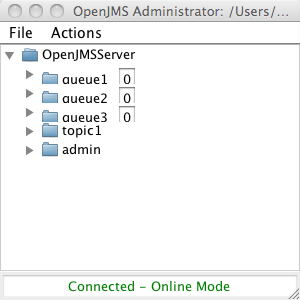
Helpful Tools
OpenJMS comes with some helpful tools that allow you to populate or retrieve messages from the JMS Queues. I used these to help me with the messages that I was posting and retrieving in Servicenow.
In order to use these you will need to browse to the
examples/basic
directory and configure the jndi.properties file.
Once that is configured, you can use the tools in that same directory to add messages to one of the queues by issuing a command similar to this:
run.sh Sender queue1 14
This command will send 14 messages to JMS queue: “queue1”. If you look in the admin utility GUI you will see that it has 14 messages in the queue.
If you then run:
run.sh Receiver queue2 14
it will pop those 14 messages off the queue and print their messages to the console.
MID Server
Up until now, none of the other instructions are really required for getting a MID Server to talk to a JMS queue. Everything up until this point has just been to help us test the solution.
Since we will be doing some JMS operations that are not part of a standard Java SDK, we need to add the additional Jar files to the MID Server’s library. In order to do this, we need to browse to the MID Server’s directory and add the libraries manually.
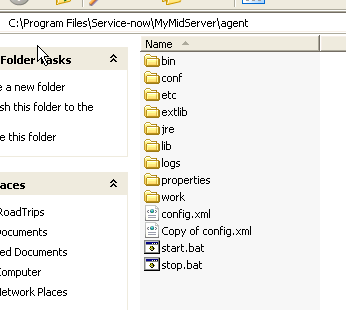
Under the “agent” directory (as shown above) you will want to create a directory called “extlib”, if it doesn’t not already exist. This extlib directory is where you can place Jar files that are dynamically loaded by the MID Server on startup.
I placed all of the library Jar from OpenJMS “lib” directory into the MID Server’s extlib directory:
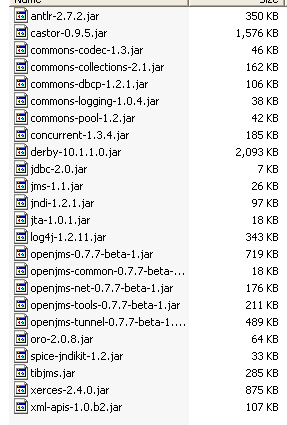
You may notice that I have also included Tibco’s JMS jar file in the mix for future testing of the prototype. However, it will not be covered here.
Sending JMS Messages
In order to send messages to a JMS queue, we will create a MID Server Script include that will be launched using a JavascriptProbe.
NAME: JMSMIDSender
SCRIPT:
1 2 3 4 5 6 7 8 9 10 11 12 13 14 15 16 17 18 19 20 21 22 23 24 25 26 27 28 29 30 31 32 33 34 35 36 37 38 39 40 41 42 43 44 45 46 47 48 49 50 51 52 53 54 55 56 57 58 59 60 61 62 63 64 65 66 67 68 69 70 71 72 73 74 75 76 77 78 79 80 81 82 83 84 85 86 87 88 89 90 91 92 93 94 95 96 97 98 99 100 101 102 103 104 105 106 107 108 109 110 111 112 113 114 115 116 117 118 119 120 121 122 123 124 125 126 127 128 129 130 131 132 133 134 135 136 137 138 139 140 141 142 143 144 145 146 147 148 149 150 151 152 153 154 155 156 157 158 159 160 161 162 163 164 165 166 167 168 169 170 171 172 173 174 175 176 177 178 179 180 181 | var JMSMIDSender = Class.create(); JMSMIDSender.prototype = { initialize : function() { try{ this.StringUtil = Packages.com.glide.util.StringUtil; this.jmsUrl = probe.getParameter("glide.jms.url"); this.jmsFactory = probe.getParameter("glide.jms.factory"); this.jmsFactoryName = probe.getParameter("glide.jms.factory.name"); this.jmsInputQueue = probe.getParameter("glide.jms.input.queue"); this.jmsOutputQueue = probe.getParameter("glide.jms.output.queue"); this.jmsUser = probe.getParameter("glide.jms.user"); this.jmsPassword = probe.getParameter("glide.jms.password"); this.fDebug = probe.getParameter("debug"); this.logString = "EXECUTION LOG: "; this.jmsPayload = probe.getParameter("jmsPayload"); this.log("jmsPayload: " + this.jmsPayload); //Connection Variables this.connectionErrorMessage = ""; this.fContext = null; this.fConnection = null; this.fSession = null; this.fDestination = null; this.currentQueue = this.jmsOutputQueue; //Initialize the Connection var initResult = this.init(); this.log("Init Result: " + initResult); if (!initResult) { message = "JMSECCSender cannot connect to JMS: " + this.connectionErrorMessage; this.log(message); probe.setParameter("JMS_ERROR_MESSAGE", message); this.term(); } else { this.log("Sending Message Payload: " + this.jmsPayload); this.send(this.jmsPayload); this.term(); } } catch (e){ this.addLogToPayload(); } this.addLogToPayload(); }, init : function() { var StringUtil = this.StringUtil; var InitialContext = Packages.javax.naming.InitialContext; var Destination = Packages.javax.jms.Destination; var Session = Packages.javax.jms.Session; var Context = Packages.javax.naming.Context; var initLog = "INIT LOG: "; //TODO: Delete me if (this.fDebug) { probe.setParameter("PROBE_DEBUG", "SET TO: " + this.fDebug); this.log("JMS Connection requested for queue: " + this.currentQueue); this.log("JMS URL: " + this.jmsUrl); this.log("JMS Factory: " + this.jmsFactory); this.log("JMS FactoryName: " + this.jmsFactoryName); this.log("JMS User: " + this.jmsUser); this.log("JMS Password: " + this.jmsPassword); } fErrorMessage = null; var answer = false; this.log("Checking JMS Properties"); if (StringUtil.nil(this.jmsUrl) || StringUtil.nil(this.jmsFactory) || StringUtil.nil(this.jmsFactoryName)) { fErrorMessage = "JMS Properties have not been set"; return answer; } this.log("Setting up JMS Connection Properties"); var properties = new Packages.java.util.Hashtable(); properties.put(Context.INITIAL_CONTEXT_FACTORY, this.jmsFactory); properties.put(Context.PROVIDER_URL, this.jmsUrl); if (!StringUtil.nil(this.jmsUser)) { properties.put(Context.SECURITY_PRINCIPAL, this.jmsUser); properties.put(Context.SECURITY_CREDENTIALS, this.jmsPassword); properties.put("java.naming.security.authentication", "simple"); } try { // create the JNDI initial context. this.log("Creating the JNDI Initial Context"); this.fContext = new InitialContext(properties); this.log("After the instanteation of the InitialContext class"); if (this.fDebug) { this.log("JMS Connection Context Created"); } // look up the Destination this.log("Looking up the destination: " + this.currentQueue); this.fDestination = this.fContext.lookup(this.currentQueue); if (this.fDebug) { this.log("JMS Connection Destination lookup OK"); } // look up the ConnectionFactory this.log("Looking up the ConnectionFactory: " + this.jmsFactoryName); var factory = this.fContext.lookup(this.jmsFactoryName); if (this.fDebug) { this.log("JMS Connection connection factory lookup OK"); } // create the connection this.log("Creating the Connection: " + this.jmsUser + "/" + this.jmsPassword); if (StringUtil.nil(this.jmsUser)){ this.log("Creating GENERIC connection"); this.fConnection = factory.createConnection(); } else{ this.fConnection = factory.createConnection(this.jmsUser, this.jmsPassword); this.log("Creating a username/password connection: " + this.jmsUser + "/" + this.jmsPassword); } if (this.fDebug) { this.log("JMS Connection connection created"); } // create the session this.log("Creating the session: " + this.fConnection); this.fSession = this.fConnection.createSession(false,Session.AUTO_ACKNOWLEDGE); if (this.fDebug) { this.log("JMS Connection session created"); } answer = true; } catch (e) { if (this.fDebug){ this.log("Exception Message: " + e.message); this.log("Exception Object: " + e); this.log("Exception Name: " + e.name); } fErrorMessage = e.message; } this.connectionErrorMessage = fErrorMessage; return answer; }, send : function(text){ //create the sender try { var mp = this.fSession.createProducer(this.fDestination); // start the connection, to enable message sends this.fConnection.start(); var message = this.fSession.createTextMessage(); message.setText(text); mp.send(message); this.log("Sent: " + message.getText()); } catch (e) { this.log("EXCEPTION:::JMS Error producing data", e); } }, term : function() { if (this.fContext != null) { try { this.log("Closing the JMS Context"); this.fContext.close(); } catch (e) { this.log("ERROR Closing JMS Context: " + e.message); } } //close the connection if (this.fConnection != null) { try { this.log("Closing the JMS Connection"); this.fConnection.close(); } catch (e) { this.log("ERROR Closing JMS Connection: " + e.message); } } }, log : function( logString ){ this.logString += "\n" + logString; ms.log(logString); //probe.setParameter("LOG", this.logString); }, addLogToPayload : function () { probe.createCDATAElement("LOG", this.logString); } }; |
The code is now in place. In order to send a message to a JMS queue, we need to create an ECC Record that tells us to do this and with what parameters.
The following is a sample ECC Record that could be created that would launch a SEND action:
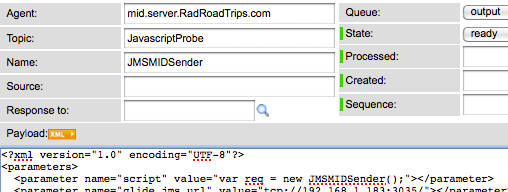
The ECC Queue Record Payload:
1 2 3 4 5 6 7 8 9 10 11 12 | <?xml version="1.0" encoding="UTF-8"?> <parameters> <parameter name="script" value="var req = new JMSMIDSender();"></parameter> <parameter name="glide.jms.url" value="tcp://192.168.1.183:3035/"></parameter> <parameter name="glide.jms.factory" value="org.exolab.jms.jndi.InitialContextFactory"></parameter> <parameter name="glide.jms.factory.name" value="ConnectionFactory"></parameter> <parameter name="glide.jms.output.queue" value="queue1"></parameter> <parameter name="glide.jms.user" value="admin"></parameter> <parameter name="glide.jms.password" value="openjms"></parameter> <parameter name="debug" value="true"></parameter> <parameter name="jmsPayload" value="My payload 1 2 3"></parameter> </parameters> |
The parameters that were used in the ECC Queue Record Payload are as follow:
- script – this is the MID Server Script Include that we will be launching
- glide.jms.url – this is the URL to the JMS Server (including port)
- glide.jms.factory – this is the Java class factory that will be used to transport the JMS message. The factory listed here is the one for OpenJMS. In order to switch to Tibco, or some other JMS server, you would change this string to the Java package string used by the server.
- glide.jms.factory.name – The factory type used to connect to the JMS server
- glide.jms.output.queue – the name of the queue that we will be sending messages to
- glide.jms.user – the username for the jms server
- glide.jms.password – the password for the jms server
- debug – set this to true if you want logging messages sent back to the ECC Queue with the response
- jmsPayload – the message that we are sending
Some notes on the current Payload XML:
In real life, the glide.jms.* settings would be automatically generated based off of the settings in the JMS Properties page of the original JMS Integration. For this prototype, we enter them manually.
Please note, for this prototype, we are sending clear text user and passwords. In an official version, I would hash the credentials together and encrypt them.
Another caveat to this solution is that if the jmsPayload contains double-quote characters(“) you will have some issues. You will need to escape the double-quotes in the message (eg: the HTML escape code for a double quote is: ").
Now that the Sending record is on the ECC Queue, we can check the OpenJMS admin utility to ensure that it arrived in Queue2 as expected:
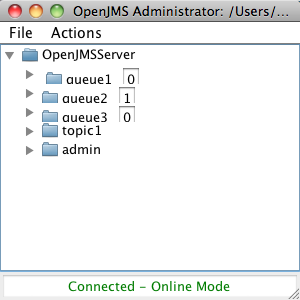
We can pop it off the queue using OpenJMS’s command line example program:

Receiving JMS Queue Messages
Now that we can send messages to a JMS queue, and we were able to verify it with OpenJMS tools, lets talk about receiving messages from a JMS Queue.
For this, I created a MID Server Script Include called, “MIDJMSReceiver”. Here is the script:
1 2 3 4 5 6 7 8 9 10 11 12 13 14 15 16 17 18 19 20 21 22 23 24 25 26 27 28 29 30 31 32 33 34 35 36 37 38 39 40 41 42 43 44 45 46 47 48 49 50 51 52 53 54 55 56 57 58 59 60 61 62 63 64 65 66 67 68 69 70 71 72 73 74 75 76 77 78 79 80 81 82 83 84 85 86 87 88 89 90 91 92 93 94 95 96 97 98 99 100 101 102 103 104 105 106 107 108 109 110 111 112 113 114 115 116 117 118 119 120 121 122 123 124 125 126 127 128 129 130 131 132 133 134 135 136 137 138 139 140 141 142 143 144 145 146 147 148 149 150 151 152 153 154 155 156 157 158 159 160 161 162 163 164 165 166 167 168 169 170 171 172 173 174 175 176 177 178 179 180 181 182 183 184 185 186 187 188 189 190 191 192 193 194 195 196 197 198 199 200 201 202 203 204 205 206 207 208 209 210 211 212 213 214 215 216 217 218 219 220 221 222 223 224 225 226 227 228 229 230 231 232 233 234 235 236 237 238 239 240 241 242 243 | var JMSMIDReceiver = Class.create(); JMSMIDReceiver.prototype = { initialize : function() { this.StringUtil = Packages.com.glide.util.StringUtil; this.jmsUrl = probe.getParameter("glide.jms.url"); this.jmsFactory = probe.getParameter("glide.jms.factory"); this.jmsFactoryName = probe.getParameter("glide.jms.factory.name"); this.jmsInputQueue = probe.getParameter("glide.jms.input.queue"); this.jmsUser = probe.getParameter("glide.jms.user"); this.jmsPassword = probe.getParameter("glide.jms.password"); this.fDebug = probe.getParameter("debug"); this.logString = "EXECUTION LOG: "; this.returnPayload = new Array(); // Connection Variables this.connectionErrorMessage = ""; this.fContext = null; this.fConnection = null; this.fSession = null; this.fDestination = null; this.currentQueue = this.jmsInputQueue; // // Initialize the Connection // try{ var initResult = this.init(); this.log("Init Result: " + initResult); if (!initResult) { message = "JMSECCReceiver cannot connect to JMS: " + this.connectionErrorMessage; this.log(message); probe.setParameter("JMS_ERROR_MESSAGE", message); this.term(); } else { this.receive(); this.term(); } this.addLogToPayload(); } catch (e){ this.addLogToPayload(); } }, init : function() { var StringUtil = this.StringUtil; var InitialContext = Packages.javax.naming.InitialContext; var Destination = Packages.javax.jms.Destination; var Session = Packages.javax.jms.Session; var Context = Packages.javax.naming.Context; var initLog = "INIT LOG: "; // TODO: Delete me if (this.fDebug) { probe.setParameter("PROBE_DEBUG", "SET TO: " + this.fDebug); this.log("JMS Connection requested for queue: " + this.currentQueue); this.log("JMS URL: " + this.jmsUrl); this.log("JMS Factory: " + this.jmsFactory); this.log("JMS FactoryName: " + this.jmsFactoryName); this.log("JMS User: " + this.jmsUser); this.log("JMS Password: " + this.jmsPassword); } fErrorMessage = null; var answer = false; this.log("Checking JMS Properties"); if (StringUtil.nil(this.jmsUrl) || StringUtil.nil(this.jmsFactory) || StringUtil.nil(this.jmsFactoryName)) { fErrorMessage = "JMS Properties have not been set"; return answer; } this.log("Setting up JMS Connection Properties"); var properties = new Packages.java.util.Hashtable(); properties.put(Context.INITIAL_CONTEXT_FACTORY, this.jmsFactory); properties.put(Context.PROVIDER_URL, this.jmsUrl); if (!StringUtil.nil(this.jmsUser)) { properties.put(Context.SECURITY_PRINCIPAL, this.jmsUser); properties.put(Context.SECURITY_CREDENTIALS, this.jmsPassword); properties.put("java.naming.security.authentication", "simple"); } try { // create the JNDI initial context. this.log("Creating the JNDI Initial Context"); this.fContext = new InitialContext(properties); this.log("After the instanteation of the InitialContext class"); if (this.fDebug) { this.log("JMS Connection Context Created"); } // look up the Destination this.log("Looking up the destination: " + this.currentQueue); this.fDestination = this.fContext.lookup(this.currentQueue); if (this.fDebug) { this.log("JMS Connection Destination lookup OK"); } // look up the ConnectionFactory this.log("Looking up the ConnectionFactory: " + this.jmsFactoryName); var factory = this.fContext.lookup(this.jmsFactoryName); if (this.fDebug) { this.log("JMS Connection connection factory lookup OK"); } // create the connection this.log("Creating the Connection: " + this.jmsUser + "/" + this.jmsPassword); if (StringUtil.nil(this.jmsUser)) { this.log("Creating GENERIC connection"); this.fConnection = factory.createConnection(); } else { this.fConnection = factory.createConnection(this.jmsUser, this.jmsPassword); this.log("Creating a username/password connection: " + this.jmsUser + "/" + this.jmsPassword); } if (this.fDebug) { this.log("JMS Connection connection created"); } // create the session this.log("Creating the session: " + this.fConnection); this.fSession = this.fConnection.createSession(false, Session.AUTO_ACKNOWLEDGE); if (this.fDebug) { this.log("JMS Connection session created"); } answer = true; } catch (e) { if (this.fDebug) { this.log("Exception Message: " + e.message); this.log("Exception Object: " + e); this.log("Exception Name: " + e.name); } fErrorMessage = e.message; } this.connectionErrorMessage = fErrorMessage; return answer; }, receive : function(text) { // create the receiver var fReceiver = Packages.javax.jms.MessageConsumer; try { this.log("Creating a Session Consumer for Queue: " + this.fDestination); var receiver = this.fSession.createConsumer(this.fDestination); this.log("Got a Session Consumer: " + receiver); // start the connection, to enable message receives this.log("Starting the connection..."); this.fConnection.start(); this.log("Connection Started"); var count = 1; count = this.getQueueSize(); this.log("Number of messages we will retrieve from queue: " + count); for (var i = 0; i < count; ++i) { this.log("Receiving Message ("+i+")..."); var message = receiver.receive(); this.log("Received message: " + message.getText()); this.log("Message Type: " + typeof(message)); this.addToReturnPayload(message.getText()); } this.setReturnPayload(); } catch (e) { this.log("EXCEPTION:::JMS Error getting data", e); this.term(); } }, term : function() { if (this.fContext != null) { try { this.log("Closing the JMS Context"); this.fContext.close(); } catch (e) { this.log("ERROR Closing JMS Context: " + e.message); } } // close the connection if (this.fConnection != null) { try { this.log("Closing the JMS Connection"); this.fConnection.close(); } catch (e) { this.log("ERROR Closing JMS Connection: " + e.message); } } }, getQueueSize : function() { var Context = Packages.javax.naming.Context; var StringUtil = this.StringUtil; try { this.log("Setting up JMS Connection Properties for Queue"); var properties = new Packages.java.util.Hashtable(); properties.put(Context.INITIAL_CONTEXT_FACTORY, this.jmsFactory); properties.put(Context.PROVIDER_URL, this.jmsUrl); if (!StringUtil.nil(this.jmsUser)) { properties.put(Context.SECURITY_PRINCIPAL, this.jmsUser); properties.put(Context.SECURITY_CREDENTIALS, this.jmsPassword); properties.put("java.naming.security.authentication", "simple"); } var ctx = new Packages.javax.naming.InitialContext(properties); var Session = Packages.javax.jms.Session; var queue = ctx.lookup(this.currentQueue); var connFactory = ctx.lookup(this.jmsFactoryName); var queueConn = connFactory.createQueueConnection(); var queueSession = queueConn.createQueueSession(false, Session.AUTO_ACKNOWLEDGE); var queueBrowser = queueSession.createBrowser(queue); queueConn.start(); count = Packages.java.util.Collections.list(queueBrowser.getEnumeration()).size(); this.log("Queue Size: " + count); queueConn.close(); return count; }catch(e){ this.log("GetQueueSize EXCEPTION: ", e); this.log(e.message); queueConn.close(); return -1; } }, addToReturnPayload : function(message){ var xml = "&"+"lt;message&"+"gt;" + message + "&"+"lt;/message&"+"gt;"; this.returnPayload.push(xml); }, setReturnPayload : function(){ var returnXml = "&"+"lt;messages&"+"gt;"; for(var i in this.returnPayload){ returnXml += this.returnPayload[i]; } returnXml += "&"+"lt;/messages&"+"gt;"; probe.createCDATAElement("returnPayload", returnXml); }, log : function(logString) { this.logString += "\n" + logString; ms.log(logString); }, addLogToPayload : function () { probe.createCDATAElement("LOG", this.logString); } }; |
Now, to trigger the receive to take place, we would normally have a scheduled job that would write the following type of ECC Queue Record…for now, we just place it on the ECC Queue manually:

1 2 3 4 5 6 7 8 9 10 | <parameters> <parameter name="script" value="var req = new JMSMIDReceiver();"></parameter> <parameter name="glide.jms.url" value="tcp://192.168.1.183:3035/"></parameter> <parameter name="glide.jms.factory" value="org.exolab.jms.jndi.InitialContextFactory"></parameter> <parameter name="glide.jms.factory.name" value="ConnectionFactory"></parameter> <parameter name="glide.jms.input.queue" value="queue2"></parameter> <parameter name="glide.jms.user" value="admin"></parameter> <parameter name="glide.jms.password" value="openjms"></parameter> <parameter name="debug" value="true"></parameter> </parameters> |
This XML is very similar to the Sending XML. The main difference is that we specify the “input” queue instead of the “output” queue. We also don’t need a jmsPayload parameter because we are receiving, not sending out a payload.
Before we save this on the ECC queue, we should populate the queue with one or more messages. I will do it using the OpenJMS utility:
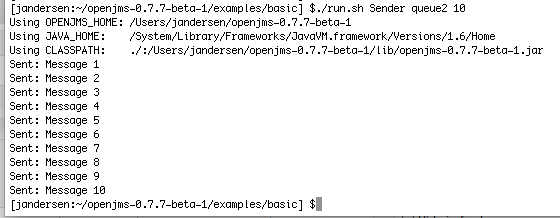
Now that the queue is populated, create the ECC Queue Entry described above.
After a few seconds, you should get an Input Record in the ECC Queue for the result.
1 2 3 4 5 6 7 8 9 10 11 12 13 14 15 16 17 18 19 20 21 22 23 24 25 26 27 28 29 30 31 32 33 34 35 36 37 38 39 40 41 42 43 44 45 46 47 48 49 50 51 52 53 54 55 56 57 58 59 60 61 62 63 64 65 66 67 68 69 70 71 72 73 74 75 76 77 78 79 80 81 82 83 84 85 | <?xml version="1.0" encoding="UTF-8"?> <results probe_time="1781"> <returnPayload><![CDATA[<messages><message>Message 1</message><message>Message 2</message><message>Message 3</message><message>Message 4</message><message>Message 5</message><message>Message 6</message><message>Message 7</message><message>Message 8</message><message>Message 9</message><message>Message 10</message></messages>]]></returnPayload> <LOG><![CDATA[EXECUTION LOG: JMS Connection requested for queue: queue2 JMS URL: tcp://192.168.1.183:3035/ JMS Factory: org.exolab.jms.jndi.InitialContextFactory JMS FactoryName: ConnectionFactory JMS User: admin JMS Password: openjms Checking JMS Properties Setting up JMS Connection Properties Creating the JNDI Initial Context After the instanteation of the InitialContext class JMS Connection Context Created Looking up the destination: queue2 JMS Connection Destination lookup OK Looking up the ConnectionFactory: ConnectionFactory JMS Connection connection factory lookup OK Creating the Connection: admin/openjms Creating a username/password connection: admin/openjms JMS Connection connection created Creating the session: org.exolab.jms.client.JmsConnection@ae2d66 JMS Connection session created Init Result: true Creating a Session Consumer for Queue: queue2-true Got a Session Consumer: org.exolab.jms.client.JmsMessageConsumer@ee644c Starting the connection... Connection Started Setting up JMS Connection Properties for Queue Queue Size: 10 Number of messages we will retrieve from queue: 10 Receiving Message (0)... Received message: Message 1 Message Type: object Receiving Message (1)... Received message: Message 2 Message Type: object Receiving Message (2)... Received message: Message 3 Message Type: object Receiving Message (3)... Received message: Message 4 Message Type: object Receiving Message (4)... Received message: Message 5 Message Type: object Receiving Message (5)... Received message: Message 6 Message Type: object Receiving Message (6)... Received message: Message 7 Message Type: object Receiving Message (7)... Received message: Message 8 Message Type: object Receiving Message (8)... Received message: Message 9 Message Type: object Receiving Message (9)... Received message: Message 10 Message Type: object Closing the JMS Context Closing the JMS Connection]]></LOG> <result><output>org.mozilla.javascript.Undefined@c87621</output></result> <parameters> <parameter name="queue" value="output"/> <parameter name="state" value="ready"/> <parameter name="debug" value="true"/> <parameter name="ecc_queue" value="34a8c44ec0a801b77af60bbde9913b80"/> <parameter name="glide.jms.user" value="admin"/> <parameter name="table_name" value="ecc_queue"/> <parameter name="name" value="JMSMIDReceiver"/> <parameter name="glide.jms.factory" value="org.exolab.jms.jndi.InitialContextFactory"/> <parameter name="topic" value="JavascriptProbe"/> <parameter name="PROBE_DEBUG" value="SET TO: true"/> <parameter name="glide.jms.input.queue" value="queue2"/> <parameter name="sys_id" value="34a8c44ec0a801b77af60bbde9913b80"/> <parameter name="script" value="var req = new JMSMIDReceiver();"/> <parameter name="glide.jms.password" value="openjms"/> <parameter name="agent" value="mid.server.RadRoadTrips.com"/> <parameter name="sequence" value="12e34a8c44e0000001"/> <parameter name="glide.jms.factory.name" value="ConnectionFactory"/> <parameter name="glide.jms.url" value="tcp://192.168.1.183:3035/"/> </parameters></results> |
We get a lot of debugging information in the result because we had debugging set to true in our ECC Queue Receiver Payload.
The important thing to note from this response is the “returnPayload” element. This contains and escaped XML string. We would probably have a business rule set on the ECC Queue so that when we get JMS responses like this, we would unescape the return Payload and we would be able to convert the string to XML and work on processing the data into other ECC Queue records that the existing JMS integration will recognize and react on.
If you read through this entire article, congratulations…go get a doughnut on me :-).
I hope to move this into the existing JMS integration in the near future.

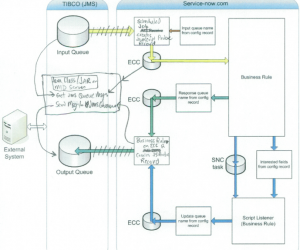




nice…..Enjoying my doughnut
Too funny Gupta! Thanks for hanging in there on the blog entry. 🙂
John,
While trying to receive messages, I get an exception saying “Not Permitted” in getQueueSize function. JMS server logs indicate that the code is trying to create queue browser (createBrowser()) as an anonymous user. However, when init function is testing connection, it does as the user set in the property.
Can you verify on your open jms server if it is the same case, i.e., the mid server tries connect as an anonymous user while executing createBrowser().
Thanks,
Amit Parikh
Can we do a SOAP Based integration between ServiceNow and TIBCO?
Yes, a lot of customers use Tibco to interface with JMS queues.
Hi John,
Do you have any additional examples of how to wire up receiving xml messages and getting them routed to take advantage of using transform maps. Also can you describe the additional challenges if the client doesn’t have the probe and sensor framework (i.e. no discovery)